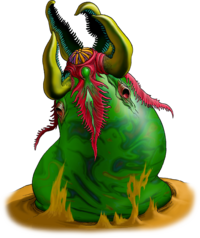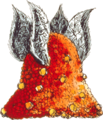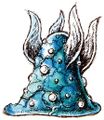| Don't like the ads? Then create an account! Users with accounts have more options than anonymous users. |
Leever
| Leever | |||
|---|---|---|---|
 Artwork from The Legend of Zelda: Ocarina of Time | |||
| First appearance | The Legend of Zelda (1986) | ||
| Latest appearance | The Legend of Zelda: Link's Awakening (Nintendo Switch remake) (2019) | ||
| |||
Leevers are spinning enemies that burrow out from underground to attack. Generally, they are found in sandy places, like deserts and beaches and are often given plant-like attributes, though in other games they have a shelled or even inorganic appearance.
History[edit]
The Legend of Zelda series[edit]
The Legend of Zelda[edit]

In The Legend of Zelda, Leevers are found in two colors, red and blue, both being found at beaches and the desert. Before they emerge, the areas of the sand they are about to come out from can be seen shaking, so Link should avoid spots he sees doing this. They are generally found in groups, with several red ones and a single blue one, which has more attacking power. The manual says that they "eat up the energy" of anything that draws too close to them.
Zelda II: The Adventure of Link[edit]

In Zelda II: The Adventure of Link, Leevers come in only blue, and only appear on sandy areas in eastern Hyrule. They spin in place under the sand with the top part visible, occasionally disappearing and reappearing elsewhere. When Link approaches, they slowly raise out and start pursuing. They can be effectively defeated with a Downward Thrust.
The Legend of Zelda: A Link to the Past[edit]

In The Legend of Zelda: A Link to the Past, Leevers are found in the Desert Palace, where they come in teal and purple (unlike most enemies, which are green and indigo). Their spikes have been replaced with large orange petals, and a pair of white stamen-like protrusions. They attack similar to the first game, though they are more abrupt with coming out of the ground, and typically do so far away from Link.
The Legend of Zelda: Link's Awakening[edit]

In The Legend of Zelda: Link's Awakening, Leevers are found early in the game at Toronbo Shores. They act like the ones in the first game and appear mostly black, but with a few lighter details that later iterations of the game color red.
The Legend of Zelda: Ocarina of Time[edit]
In The Legend of Zelda: Ocarina of Time, Leevers appear in the Haunted Wasteland, where they start appearing midway through the Phantom Guide challenge, and outside the Desert Colossus. They are small and green, spawning endlessly from the ground and spinning at Link. They are extremely weak, particularly against adult Link, so their main strength is in numbers and speed. A particular quirk in the 64-bit versions of the game is that the target reticle is green for them instead of yellow like most enemies; this may be related to how no enemy music plays for them. Additionally, they, like Guays and Stalchildren, have an easter egg where if a large amount of them are defeated, a larger one appears. The larger Leever is dark purple, has a proper reticle and music, and moves much slower than the normal one. Additionally, no normal ones appear while it is active. If not defeated, it will burrow under the ground again and despawn. The Nintendo Power Player's Guide calls it a type of cactus, though its artwork gives it more worm-like characteristics.
In Master Quest, a particular room in the Spirit Temple has a set amount of Leevers to be defeated to cause a Treasure Chest to appear, making them the only limited amount of Leevers in the game. In The Legend of Zelda: Ocarina of Time 3D, all Leevers have yellow target reticle, but keep the lack of enemy music for the green ones.
The Legend of Zelda: Majora's Mask[edit]
In The Legend of Zelda: Majora's Mask, Leevers appear on the west side of Termina Field and around Great Bay. They look like the ones in Ocarina of Time, but are larger. They typically appear alone in this game, and have the proper reticle and enemy music. Unlike most games, they do not spawn infinitely, and as such if Link defeats a certain amount, they will stop appearing until he leaves the area or the next segment of the three-day cycle begins.
The Legend of Zelda: Oracle of Seasons[edit]

In The Legend of Zelda: Oracle of Seasons, Leevers appear in red, blue, and orange. Red and blue ones can be found in the Woods of Winter, despite them not being sandy, and around Eyeglass Lake, where they can even come out from frozen water. The blue type also appears on Goron Mountain and Natzu Wasteland. They have the same attack power as each other, and their health is only noticeably different when attacking with specific weapons. Between them, only the blue ones can change movement direction aboveground.
Orange ones with the same health as the red ones are found in the Samasa Desert and act much differently, being more similar to the ones from Ocarina of Time. Whenever Link goes onto a section of the map with Leevers present, one or two Leevers will come out of random spots in the ground and quickly chase Link. If they are defeated, they will be quickly replaced by more Leevers from the same spot on the ground. If left alone a while, they might burrow underground, but will come back out from the same square they burrowed into shortly afterwards.
The Legend of Zelda: Oracle of Ages[edit]

In The Legend of Zelda: Oracle of Ages, Leevers appear in red and blue, with both acting like the ones in Oracle of Seasons. They initially appear on Crescent Island and also appear in Rolling Ridge Base in the present, despite it not being sandy. In the northern half of Talus Peaks, red ones appear in the present while blue ones appear in the past and a single section of the present. They additionally appear in Nuun Highlands if Moosh is Link's partner.
The Legend of Zelda: Four Swords Adventures[edit]

In The Legend of Zelda: Four Swords Adventures, Leevers are first encountered early in the Desert of Doubt, in the sandstorm right outside the Gerudo village, and continue to appear throughout the stage. They look just like the ones in A Link to the Past, except entirely green. They constantly rise from and lower into the sand while spinning, even if all the Links are on the Game Boy Advance screen. When this happens, they move continuously downward until they hit a wall. Later in the level, a single stronger red one can be found.
The Legend of Zelda: The Minish Cap[edit]

In The Legend of Zelda: The Minish Cap, Leevers have a gray, metallic appearance, but still appear in red and blue varieties with their typical behavior. Their general design seems to stem from the previous Game Boy games. Red ones appear at the Wind Ruins, while blue ones appear near Veil Falls. Their figurine claims they appear in Mount Crenel and Castor Wilds, though this seems to actually be referring to Peahat.
The Legend of Zelda: Twilight Princess[edit]
In The Legend of Zelda: Twilight Princess, Leevers are found in the large field near the Bridge of Eldin and outside the Arbiter's Grounds. Unlike typical Leevers, these are shaped like spiked spinning tops, and only come in green. They have a group of small, stamen-like appendages near an opening in the top of them, inside of which a yellow spiderweb-like texture can be seen. They burrow out of the ground in rings around Link, typically in a group of three.
The Legend of Zelda: A Link Between Worlds[edit]
In The Legend of Zelda: A Link Between Worlds, Leevers are again found in the Desert Palace in their capacity in A Link to the Past. However, due to it now being a late-game dungeon, only the purple type appears. They also appear in the Treacherous Tower.
The Legend of Zelda: Tri Force Heroes[edit]
In The Legend of Zelda: Tri Force Heroes, Leevers appear like they do in A Link Between Worlds. They appear in the Infinity Dunes stage of The Dunes, as well as the desert zone of the Den of Trials.
Zelda's Adventure[edit]

In Zelda's Adventure, Leevers are found near the Vision Henge. Instead of spinning, they repeatedly bend their stalks to the side as they move, and do not burrow.
Cadence of Hyrule: Crypt of the NecroDancer featuring The Legend of Zelda[edit]

In Cadence of Hyrule: Crypt of the NecroDancer featuring The Legend of Zelda, Leevers appear in green and blue. They spin in place until the player approaches, at which point they will burrow under the sand for four beats, burst out, follow for four more beats, and repeat the process.
Profiles[edit]
The Legend of Zelda[edit]
Manual comment[edit]
"They live in the ground and eat up the energy of creatures that approach them. Blue Leevers are a little stronger, but the red ones don't have much attacking power."
The Legend of Zelda: Ocarina of Time[edit]
[edit]
Leever
"Watch its movements closely and let it go by!"
Nintendo Power Player's Guide description[edit]
"Native to the desert wasteland, the Leever was a malicious cactus with a taste not for water, but for blood. The prickly plant may have moved slowly, but its sting was fatal."
The Legend of Zelda: Majora's Mask[edit]
Tatl comment[edit]
"You know about the Leever, right? It actually moves pretty fast. That's not exactly good news, is it?"
The Legend of Zelda: The Minish Cap[edit]
Figurine description[edit]
"Appears in Castor Wilds, Mount Crenel, etc. These baddies move freely underground and pop out for a surprise attack. Keep your shield up!"
The Legend of Zelda: Majora's Mask 3D[edit]
Tatl comment[edit]
"It's a Leever.
It actually moves pretty fast. That's not exactly good news, is it?"
The Legend of Zelda: Tri Force Heroes[edit]
PRIMA guide description[edit]
LEEVER
"A classic Zelda enemy, the Leever shows up in sandy areas where it can burrow into the ground and pop up in other areas of the map. They'll spin around rapidly, but other than that, there isn't much to them. Reaching them while they whiz around the room can be a pain, but unless they touch you directly, they have no offensive capabilities."
Gallery[edit]
-
The Legend of Zelda (blue)
-
BS Zelda no Densetsu
-
BS Zelda no Densetsu
-
BS Zelda no Densetsu
Names in other languages[edit]
| Language | Name | Meaning |
|---|---|---|
| Japanese | リーバー Rībā リーバ Rība ピーハット[1] Pīhatto |
Leever Leever Peahat (Four Swords+, mistake) |
| Spanish | leever | - |
| French | Leever | - |
| Dutch | Leever | - |
| German | Sandkiller | - |
| Italian | leever | - |
| Russian | лиивер liiver |
leever |
| Korean | 리버 Libeo |
Leever |
| Chinese | 嗜血仙人掌 Shìxiě Xiānrénzhǎng 利巴 Lìbā |
Bloodsucking Cactus (Ocarina of Time) Leever |
References[edit]
- ^ Zelda no Densetsu: Yottsu no Tsurugi+ Shogakukan guide, page 15.
- Plants
- The Legend of Zelda enemies
- Zelda II: The Adventure of Link enemies
- The Legend of Zelda: A Link to the Past enemies
- Zelda's Adventure enemies
- The Legend of Zelda: Link's Awakening enemies
- The Legend of Zelda: Ocarina of Time enemies
- The Legend of Zelda: Majora's Mask enemies
- The Legend of Zelda: Oracle of Seasons enemies
- The Legend of Zelda: Oracle of Ages enemies
- The Legend of Zelda: Four Swords Adventures enemies
- The Legend of Zelda: The Minish Cap enemies
- The Legend of Zelda: Twilight Princess enemies
- The Legend of Zelda: A Link Between Worlds enemies
- The Legend of Zelda: Tri Force Heroes enemies
- Cadence of Hyrule: Crypt of the NecroDancer featuring The Legend of Zelda enemies








